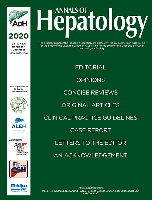
Annals of Hepatology
Scope & Guideline
Diving deep into the world of hepatology and liver diseases.
Introduction
Aims and Scopes
- Hepatocellular Carcinoma Research:
The journal extensively covers research on hepatocellular carcinoma (HCC), focusing on prognostic factors, treatment efficacy, and novel therapeutic approaches, including immunotherapy and machine learning applications. - Metabolic Liver Diseases:
There is a significant emphasis on metabolic dysfunction-associated liver diseases, including non-alcoholic fatty liver disease (NAFLD) and its evolving nomenclature, reflecting a growing recognition of their clinical importance. - Viral Hepatitis Studies:
The journal publishes numerous articles on viral hepatitis, particularly hepatitis B and C, exploring topics from epidemiology to therapeutic advancements and the impact of these infections on liver health. - Transplantation and Surgical Interventions:
Research related to liver transplantation, including outcomes, complications, and innovative surgical techniques, is a core area, highlighting advancements in the management of end-stage liver disease. - Clinical and Epidemiological Insights:
The journal provides insights into the clinical aspects of liver diseases, including epidemiological studies that assess the burden of liver diseases in different populations, particularly in Latin America. - Emerging Therapeutic Approaches:
There is a focus on novel therapeutic strategies, including the use of biomarkers, liquid biopsies, and personalized medicine approaches to improve diagnosis and treatment outcomes in liver diseases.
Trending and Emerging
- Artificial Intelligence and Machine Learning in Hepatology:
There is an increasing trend towards integrating artificial intelligence and machine learning techniques to enhance diagnostic accuracy and predict patient outcomes in liver diseases. - Focus on Comorbidities and Multidisciplinary Approaches:
Research that explores the interplay between liver diseases and comorbidities, such as diabetes and cardiovascular diseases, is gaining traction, highlighting the need for a holistic approach to patient management. - Immunotherapy and Precision Medicine:
The application of immunotherapy in liver cancer treatment and the tailoring of therapies based on individual patient profiles are emerging as significant areas of interest in the journal. - Global Health Perspectives on Liver Diseases:
There is a growing emphasis on the epidemiological aspects of liver diseases in different regions, particularly in Latin America, reflecting the journal's commitment to addressing health disparities and public health challenges. - Patient-Centered Research and Quality of Life Studies:
A trend towards patient-centered research, focusing on the quality of life and psychosocial aspects of living with liver disease, is becoming more prominent, indicating a shift in research priorities.
Declining or Waning
- Traditional Alcohol-Related Liver Disease Research:
There has been a noticeable decline in papers specifically focused on traditional alcohol-related liver disease, as newer research trends emphasize metabolic liver diseases and their associated comorbidities. - Basic Science and Animal Models:
Studies relying heavily on basic science and animal models are becoming less frequent, with a shift towards clinical research and real-world evidence that informs practice directly. - Outdated Diagnostic Methods:
Research focused on older diagnostic methodologies, such as invasive liver biopsies, seems to be declining, with more emphasis on non-invasive techniques and biomarkers for liver disease assessment. - Hepatitis E Research:
While hepatitis E remains important, the number of studies specifically addressing this virus has decreased, possibly due to a growing focus on more prevalent viruses like hepatitis B and C.
Similar Journals
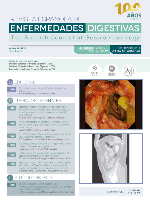
REVISTA ESPANOLA DE ENFERMEDADES DIGESTIVAS
Fostering collaboration in the field of digestive health.REVISTA ESPANOLA DE ENFERMEDADES DIGESTIVAS, a pivotal Open Access journal published by ARAN EDICIONES, S A, has been at the forefront of advancing the field of gastroenterology since its inception in 1990. With a robust commitment to disseminating high-quality research, the journal provides a platform for researchers, clinicians, and students to share innovative findings and insights concerning digestive diseases. The journal is characterized by its Q3 ranking in both Gastroenterology and Miscellaneous Medicine categories, indicative of its significant contributions to these fields, and is positioned within the 36th percentile of Scopus rankings for medicine related to gastroenterology. Based in Spain, REVISTA ESPANOLA DE ENFERMEDADES DIGESTIVAS has embraced the Open Access model since 2004, ensuring that its articles are readily available to a global audience without financial barriers. The journal not only supports academic discourse but also plays a crucial role in improving clinical practices and health outcomes related to digestive health.

World Journal of Hepatology
Transforming liver disease understanding through open access.World Journal of Hepatology is a premier academic journal dedicated to advancing the field of hepatology. Published by BAISHIDENG PUBLISHING GROUP INC, this journal serves as a crucial platform for disseminating innovative research findings and critical reviews from around the globe. With its ISSN 1948-5182 and E-ISSN 1948-5182, the journal has established a notable presence since its inception in 2009, covering a wide range of topics relevant to liver diseases, including but not limited to hepatitis, liver cancer, and metabolic liver disorders. Currently ranked 41/82 in the field of hepatology by Scopus, representing the 50th percentile, it has achieved a Q3 quartile ranking in the 2023 category, underscoring its growing influence in the medical community. With a commitment to open access for its readership, the World Journal of Hepatology enriches the global discourse on liver health and disease management, making it an essential resource for researchers, clinicians, and students alike.
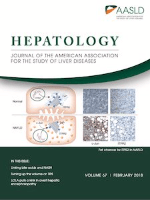
HEPATOLOGY
Transforming liver health with groundbreaking insights.HEPATOLOGY is a premier scholarly journal dedicated to advancing the field of liver research and clinical practice. Published by Lippincott Williams & Wilkins, this journal boasts an impressive impact factor and holds a prestigious position as one of the top-ranked publications in both Hepatology (Q1) and Medicine (miscellaneous, Q1) categories as of 2023. HEPATOLOGY, with its commitment to disseminating high-quality research since its inception in 1981, serves as an essential platform for researchers, clinicians, and students focusing on liver diseases, including hepatitis, cirrhosis, and liver cancer. The journal's editorial board comprises leading experts who guide the publication towards its objective of fostering innovation and collaboration in this critical area of health. Although it does not offer an open access model, HEPATOLOGY ensures that its comprehensive analyses, reviews, and groundbreaking studies are accessible to the global medical community. Join the discourse in hepatology and be a part of a transformative journey through this indispensable resource.
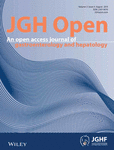
JGH Open
Fostering Collaboration for Global Health AdvancesJGH Open is a prominent open-access journal dedicated to advancing knowledge in the fields of Gastroenterology and Hepatology, published by WILEY. Since its inception in 2017, the journal has served as a crucial platform for researchers, professionals, and students to disseminate innovative research findings and clinical insights. With an impact factor and Scopus rankings reflecting its steady growth—ranking in the 3rd quartile for both Gastroenterology (Q3) and Hepatology (Q3)—JGH Open is positioned within the competitive landscape of medicine. Its commitment to open access enhances the visibility and accessibility of high-quality research, ensuring that significant advancements in understanding diseases of the gastrointestinal tract and liver reach a broad audience. With a focus on collaboration and dissemination of knowledge, JGH Open aims to contribute to the global discourse and improve outcomes in gastrointestinal health.
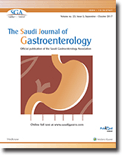
Saudi Journal of Gastroenterology
Elevating standards in gastrointestinal research and practice.The Saudi Journal of Gastroenterology is a premier platform dedicated to advancing research and clinical practice in the field of gastroenterology. Published by Wolters Kluwer Medknow Publications, this open-access journal has been serving the academic community since 1995 from its base in India. With an ISSN of 1319-3767 and an E-ISSN of 1998-4049, the journal allows unrestricted access to a wealth of knowledge, fostering an environment where researchers, professionals, and students can engage with cutting-edge studies. As of 2023, it is categorized in the Q3 quartile within gastroenterology, ranking #74 out of 167 in Scopus, which places it within the 55th percentile of its field. The journal aims to disseminate significant findings, clinical trials, and innovative theories that shape the understanding of gastrointestinal disorders and practices. With a commitment to quality and relevance, the Saudi Journal of Gastroenterology is pivotal for anyone seeking to enhance their knowledge and expertise in this vital area of medicine.

Translational Gastroenterology and Hepatology
Advancing Patient Outcomes through Translational Research.Translational Gastroenterology and Hepatology, published by AME Publishing Company, stands as a pivotal platform for advancing the understanding and treatment of gastrointestinal and liver diseases. With its focus on translational research, this journal aims to bridge the gap between laboratory discoveries and clinical applications, thus fostering improvements in patient care. Although specific metrics like H-Index and Scopus ranks are currently unavailable, the journal is committed to maintaining high standards of scholarly communication and excellence. As an open-access publication, it ensures that valuable findings are readily accessible to a global audience, promoting collaboration and innovation among researchers, clinicians, and healthcare professionals invested in gastroenterology and hepatology. The journal's dedication to disseminating groundbreaking research makes it an essential resource for those seeking to stay at the forefront of these ever-evolving fields.
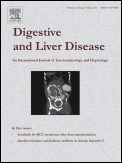
DIGESTIVE AND LIVER DISEASE
Advancing knowledge in gastroenterology and hepatology.DIGESTIVE AND LIVER DISEASE is a prominent journal published by Elsevier Science Inc, dedicated to advancing the field of gastroenterology and hepatology. With an ISSN of 1590-8658 and an E-ISSN of 1878-3562, this journal has established itself as a significant resource within the academic community, especially considering its Q2 ranking in both gastroenterology and hepatology categories as of 2023. Spanning from 2000 to 2024, the journal presents a diverse array of peer-reviewed articles, clinical studies, and review papers that explore the latest advancements and research findings in digestive and liver diseases. The journal's robust impact, reflected in its Scopus rankings—40th out of 167 in gastroenterology and 28th out of 82 in hepatology—highlights its critical role in shaping practices and understanding in these vital areas of medicine. With open access options available, DIGESTIVE AND LIVER DISEASE aims to make high-quality research accessible to a wider audience, thereby encouraging collaboration and innovation. Researchers, healthcare professionals, and students alike will find valuable insights into the complex mechanisms, diagnostics, and therapeutic strategies pertinent to digestive and liver health.
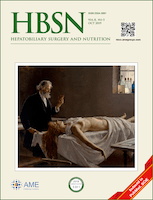
Hepatobiliary Surgery and Nutrition
Elevating standards in hepatobiliary surgery and nutrition.Hepatobiliary Surgery and Nutrition is a leading journal dedicated to advancing the fields of hepatobiliary surgery and nutritional science, published by AME Publishing Company. With a commitment to disseminate high-quality research, this journal serves as a vital platform for clinicians, researchers, and students alike to share their findings and insights related to liver and biliary health. The journal operates under an Open Access model, ensuring that cutting-edge research is readily available to a global audience. Although specific rankings and impact factors are currently not provided, the journal's focus on innovative surgical techniques and nutritional strategies underscores its importance in improving patient outcomes and shaping future practices in hepatobiliary medicine. Situated in Hong Kong, Hepatobiliary Surgery and Nutrition invites submissions that push the boundaries of knowledge in these crucial areas, fostering a collaborative environment for advancement in surgery and nutrition.

Hepatology Forum
Connecting professionals for a healthier tomorrow.Hepatology Forum is an esteemed journal dedicated to disseminating cutting-edge research and insights in the fields of gastroenterology and hepatology. Published by KARE PUBL in Turkey, this journal serves as a vital platform for researchers, clinicians, and healthcare professionals aiming to advance their knowledge and practices related to liver diseases and gastrointestinal disorders. With an ISSN of 1307-5888 and an E-ISSN of 2757-7392, it features peer-reviewed articles that encompass a wide range of topics from basic research to clinical applications. Although categorized in the Q3 quartile for both gastroenterology and hepatology in 2023, Hepatology Forum continues to show significant potential for growth and impact, as evidenced by its Scopus rankings. Through its commitment to open scientific exchange, the journal not only facilitates the sharing of innovative methodologies and findings but also fosters networking among professionals in the field. As it converges through the years from 2020 to 2024, Hepatology Forum remains an important resource for the advancement of liver health and diseases, appealing to both established experts and emerging scholars alike.

Korean Journal of Gastroenterology
Fostering Global Dialogue on Digestive HealthKorean Journal of Gastroenterology (ISSN: 1598-9992, E-ISSN: 2233-6869), published by the Korean Society of Gastroenterology, has been a premier outlet for research and advancements in the field of gastroenterology since its inception in 1968. This open-access journal, based in South Korea, fosters a global dialogue on gastrointestinal health, embracing contributions from a diverse array of disciplines within medicine. It is currently ranked in the Q4 quartile for miscellaneous medicine and holds a Scopus rank of #323 out of 636 in general medicine, reflecting its commitment to publishing impactful research despite its relatively recent establishment in high-impact metrics. With a continuous publication timeline extending through to 2024, the journal aims to enhance understanding of gastrointestinal disorders and promote innovative treatments, making it an essential resource for researchers, clinicians, and students alike who seek to stay abreast of the latest developments and clinical applications in gastroenterology.